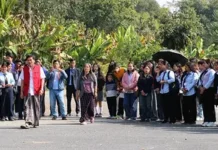ITANAGAR, Nov 20: The state government is likely to frame a specific law to deal with people who throw garbage at public places other than designated ones.
Urban Development Secretary SK Jain, who attended the inaugural day of a two-day state level workshop on SBM (U) at the state convention centre here on 19 November, said penalty would be imposed on those who litter public places and throw garbage beyond the designated locations or places by framing a specific law.
Jain urged the participants from various sections of the society, including government establishments and educational institutes, to attend the workshop and training sincerely, “so that implementation of SBM [U] at the ground level can be done with ease and effectively eradicate open defecation.”
The workshop-cum-training also focussed on IEC in SBM (U).
Chief engineers and Urban Development & Housing Director Taba Tedir emphasized the importance of segregation of solid waste at source for proper and scientific waste disposal.
“For effective segregation of waste at source, social and community mobilization is necessary,” Tedir, who is also the state mission director of SBM (U), said.
The programme was organized coinciding with the World Toilet Day. Students from Green Mount Higher Secondary School, Itanagar presented a drama on the main subject.
The technical session, spread over two days, saw the participation of SBM brand ambassador Lily T Jamoh, Nido Tama, Tasaso Yun, officers and officials from the Itanagar and Pasighat municipal councils, representatives of the Itanagar and Naharlagun market committees, the autorickshaw and Tempo unions of Itanagar and Naharlagun, NGOs, and students and teachers of King Cup Public School and Green Mount Higher Secondary School, Itanagar.
The joint directors, deputy directors, urban programme officers and other senior officers and officials of the department also attended the programme, during which central government-empanelled experts imparted training as resource persons.
The topics covered during the workshop and training included door-to-door collection, community mobilization, anti-defacement campaigns, waste to energy and waste to compost, behavior change and composting.
Certificates were given to all the participants of the workshop and training.


